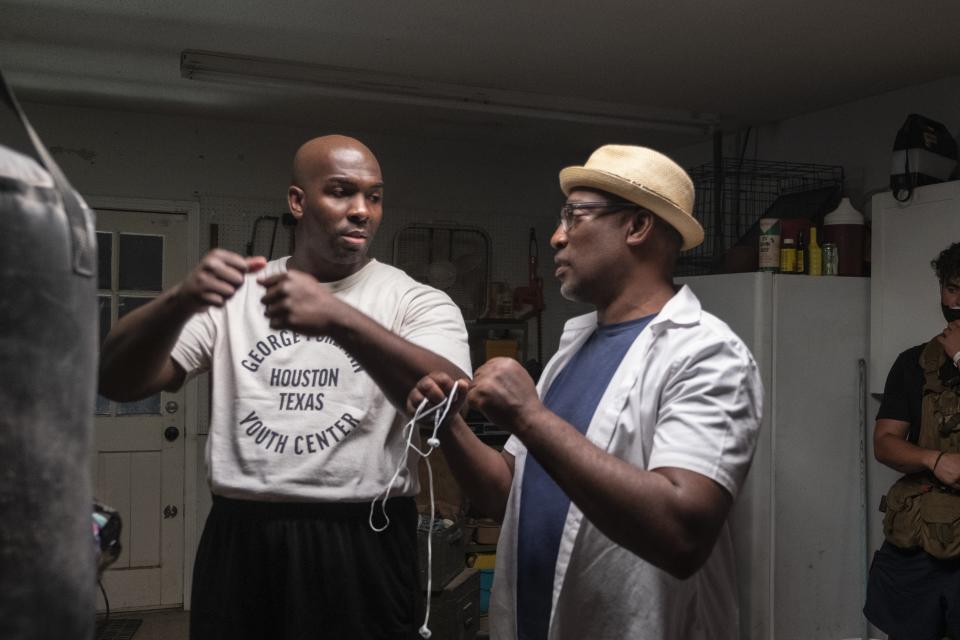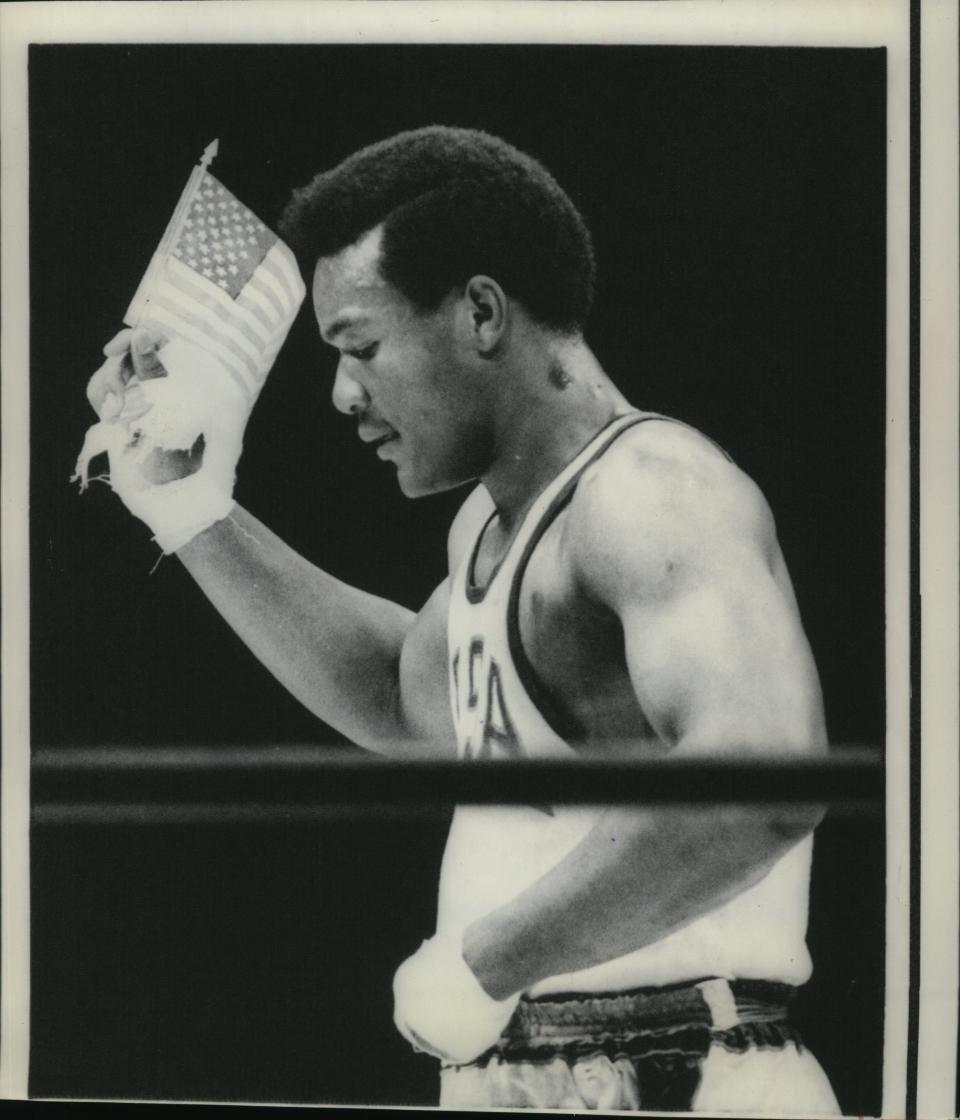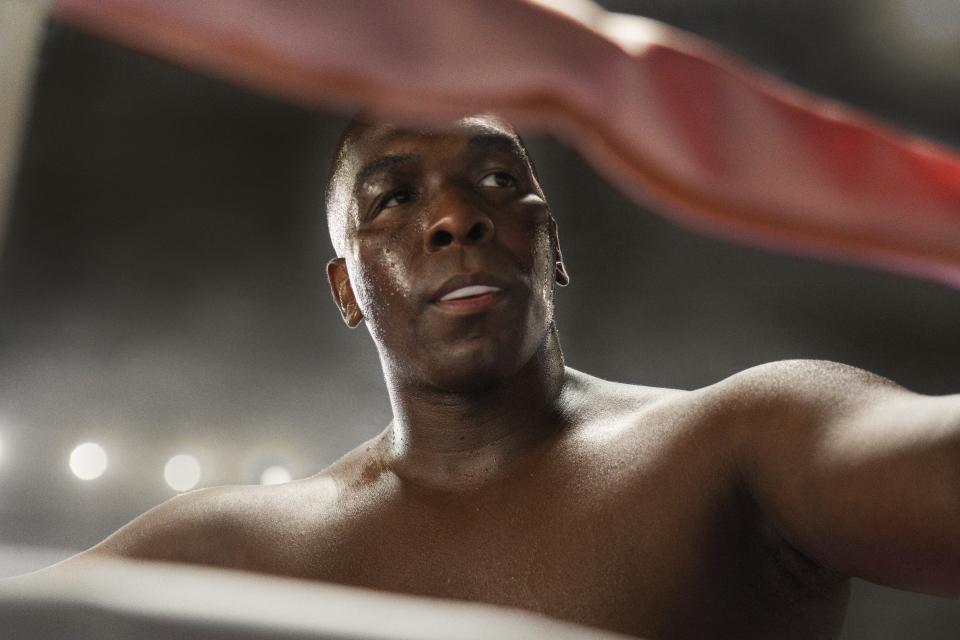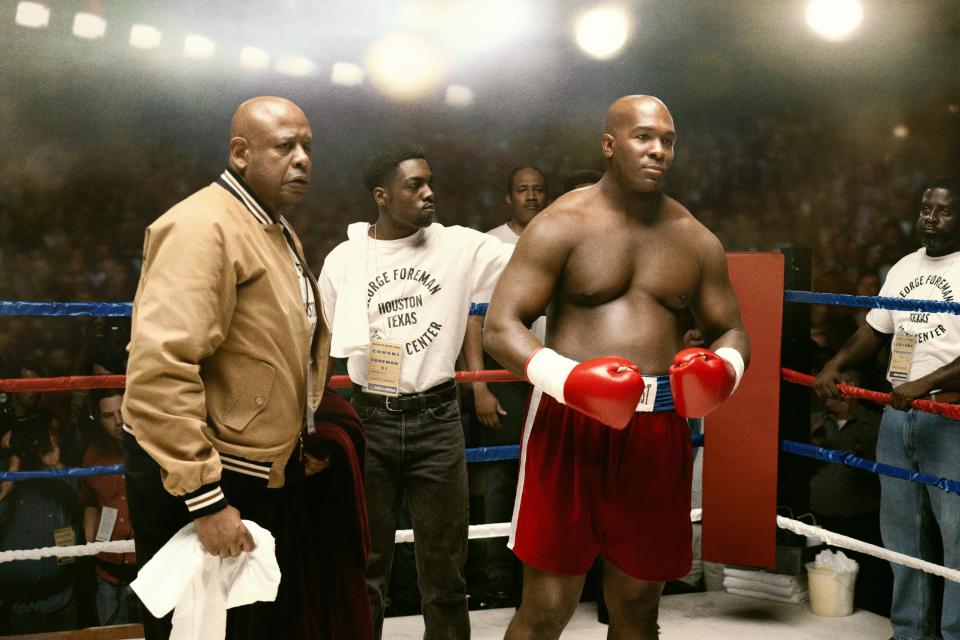With 'Big George Foreman,' filmmaker George Tillman Jr. tells story of a 'throwaway kid' who became champ

Before George Foreman became one of the most feared heavyweight champions ever, he was an angry child who bullied others on the streets of Houston’s Fifth Ward. He witnessed a lot of violence. While some people carried weapons for protection, Foreman’s weapons were his fists and his 6-foot-4-inch frame.
Foreman dropped out of school in 10th grade and started abusing alcohol. He robbed people just to have something to do.
In 1965, he left Houston for the Job Corps in California, but his troubles followed. After he got into a physical altercation in the dorms, Doc Broaddus, a Job Corps counselor and boxing coach, challenged Foreman to use that aggression in the ring.
Broaddus' mentorship led to Foreman winning a gold medal at the Mexico City 1968 Olympic Games. Foreman turned pro and knocked out previously undefeated Joe Frazier in 1973 to capture the world heavyweight title. Foreman would lose his title to Muhammad Ali in the “Rumble in the Jungle” in 1974.
In 1977, Foreman stepped away from boxing for a decade to become a minister, but financial hardships would force the former champ to step back into the ring. Foreman shocked the world in 1994 when he stopped reigning champion Michael Moore in the 10th round to regain the heavyweight title. Foreman would become the oldest fighter to ever hold the heavyweight championship at 45.
“To many people, Foreman was a throwaway kid. He was someone who stayed in trouble. Someone who society had given up on, but Doc saw something in him, and it changed both of their lives,” said George Tillman Jr., whose film “Big George Foreman” opens in theaters April 28.
More: Milwaukee's George Tillman Jr. on why 'Soul Food' still resonates and what's next for the director
Tillman, 53, a Milwaukee native and lifelong friend, talked with me about why he took on this biopic; his love for boxing; why every child has value; and the challenges he faced doing the film. Tillman's previous films as a director include "Soul Food," "Notorious" and "The Hate U Give."
This is your first sports film. Why a biopic on George Foreman?
I used to watch fights on ABC Sports on Saturdays growing up. It would be Ali, Foreman, Joe Frazier, Ken Norton. I would be glued to the TV because of Howard Cosell. In 1991, I remember the Foreman vs. Holyfield fight. I was rooting for George because at the time he wanted to fight Mike Tyson. I was rooting for the guy I wasn’t rooting for in the 1970s. I started to like Foreman because he went from a boxer who I didn’t like or root for to a person I wanted to win and love. That journey was interesting to me not only as a fan, but as a filmmaker.
Were you a boxing fan growing up?
I remember watching Sugar Ray Leonard fights in the '80s. I was a fan because my dad was a huge fan. HBO used to have big fights, and during those times Larry Holmes was dominating the heavyweight division. We would go over to a family member's house or someone from church who would have that HBO package. Watching these fights with my dad and family members is where my love for boxing started and continued.
'Creed 3' made $100 million in its first weekend. How does this bode for 'Big George Foreman'?
It really doesn’t have anything to do with my film. Our film is a biopic, so it’s the history of a real person. I’m a big fan of the "Creed" franchise, Michael B. Jordan and all the "Rocky" films. "Rocky" is the original boxing movie. That’s the film you look up to. It’s great that people love boxing films because if they didn’t go over, Hollywood can decide they don’t want to make them. "Creed’s" success is a great thing because it opens the doors for other boxing films. The reason I got the chance to make “Soul Food” was because “Waiting to Exhale” did well. "Waiting to Exhale" was the first film to have four African American women — Whitney Houston, Angela Bassett, Loretta Devine and Lela Rochon — in lead roles. By the time I got to "Soul Food" with three African American women, they gave me the green light. "Creed’s" success shows audiences want to see movies with sports athletes.
What challenges did 'Big George Foreman' give you?
The first thing was how do we cover all these years and his story. Sometimes you get a biopic, and you can take a section of time, but George Foreman’s story didn’t work like that. We had to tell the entire story. When he was young, he was angry. He became the heavyweight champion of the world who was knocking everyone out. He retired and became a minister. But he was drawn back to boxing because of financial hardships.

We ended up covering about 60 years of his life and there was no way around it. Foreman wanted us to keep his conversion in the film. When he was in Puerto Rico for a bout with Jimmy Young, Foreman had a conversion in the locker room that changed his life and moved him toward spirituality.
The second challenge was staying on budget. The third issue was a hurricane in New Orleans that stopped production and, right after the hurricane, COVID-19 happened. We had to sit for a year before we could start shooting. When we went back to shooting, another hurricane stopped us again.
Then we lost Michael K. Williams in 2021. He was supposed to play Doc Broaddus. At that point, I didn’t have an actor to play Doc. Thank God, Forest Whitaker read the script and wanted to do the movie.
How long did it take you to complete the film?
I started in late 2019. COVID-19 was in 2020. Got back to filming in 2021, and we just finished (March 24), so it took us three years.
COVID and the hurricanes slowed us down, but a lot of productions halted and stopped. We had to retrain ourselves how to work in the age of COVID. Wearing masks, we had to get tested every couple of days, and practice social distancing.
Khris Davis, who plays George Foreman, is the star of the film. What can you tell me about his acting abilities playing a prizefighter?
My casting director saw him in a Broadway play called “The Royale,” where he played Jack Johnson. I never saw the play, but when I saw a photo of him, I was like, wow, this guy looks amazing, so we had to bring him in. He had the chops as an actor coming from New York and Broadway. He also has the size, at 6 foot 4.

He was able to get down to Foreman’s fighting weight in the 1970s, and he had the frame to play Big George when he was on his comeback tour. We didn’t need any visual effects. He was committed. When COVID shut things down, it gave him time to practice Foreman’s dialect. Since he wasn’t a boxer, it also gave us time to get some training in for him as well.
We shot the first half of the movie with him as the powerhouse Foreman, and then we stopped for seven weeks and when he came back, he was at 260 pounds. We helped him put on that weight by using a trainer from the New Orleans Saints. When I saw him after seven weeks, he looked like a totally different dude with weight and bald head. He looked like Big George Foreman.
Why do you film in New Orleans?
New Orleans offers a great tax incentive, which means you get more for your dollar. It also looks like Houston’s Fifth Ward, where Foreman grew up. He was known as the “King of Jungle” there and he would fight anyone who wanted to fight. He wasn’t scared of anyone. He was the guy that forced the toughest guys to cross the street if they saw him coming. New Orleans gave us the best visuals to create those locations.
You were still doing tweaks to the film up to the last minute. What were you taking care of?
We had to take care of the visual effects. COVID limited the amount of people we could have for crowd scenes. When Foreman fought Muhammad Ali in the "Rumble in the Jungle" in Zaire, there were 60,000 in attendance. We had to use special effects and technology to recreate those scenes.
We also had to recreate the boxing rings and the fans for the Jimmy Young vs. Foreman fight. We did a lot of recreating those scenes in Los Angeles by building the visual affects through blue screen. We got those shots last, and we had to do some color correcting and final mixing up to the last minute.
What goes through your mind right before the release?
I always just want the audience to like it. I try to make films where people can find the humanity in the characters. When I did the 2013 film “The Inevitable Defeat of Mister and Pete,” that film was about we all need someone in our life. You can’t do anything alone. I just want people to get those nuggets. "Soul Food" stressed the importance of keeping family traditions. “The Hate U Give” is about teaching Black children about how to deal with police, before you can even have a tough talk with them about anything else like sex. With "Big George," I just want people to walk away with knowing that anything is possible. An angry man can become lovable. A 45-year-old man can regain a world boxing title 20 years after losing it and, on top of that, he became the first heavyweight champion who beat an opponent 19 years younger than him to win a title.
The main thing is, I just want people to walk away and say this movie was good.
How did you prepare to make a boxing film? Did you do anything different?
I didn’t watch any other films. I just listened to George Foreman talk. I didn’t want to be influenced by anything but his story. I just went with my instincts.
How much influence did George Foreman have on the film?
We talked a lot, at least once or twice every couple of weeks. He wanted to make sure we got the story right. My main thing was to get in his head to know what he was thinking. Foreman didn’t tell me what to put in the film, but with someone like him you must practice active listening. I wanted to know what was important to him.

I was able to recognize that Foreman was like a lot of African American kids today who are being looked over, forgotten and written off. He took what society dished out on him and turned that into anger. A lot of our youth are being written off before their lives can fully begin.
Have you ever been written off?
Man, let me tell you. When I was at John Marshall High School, a lot of my friends — you, Mac Strawder, Derek Harper — you were in programs for academically talented classes, and I was in the classes with the worse of the worse. We all had a good time, and we were all great friends, but I was never considered for those specialty classes.
Remember they had a competency test that you needed to pass before you could graduate. I struggled with math. You can pass every grade, but if you didn’t pass this competency test, you can’t graduate. I was going crazy studying, but I was never a good test taker, and it came down to my senior year for me to finally pass that math portion of the test.
People believed in my creative sense at Marshall, but not the educational side. The worst part came for me when I was at Columbia College film school in Chicago. I always made the best films in school, but it was this one chairman who would never give me my props. I wrote a script and I told him I wanted to turn it into a movie with the funds from the film department because the best script received the funds.
He said, "I read your script and there are a lot of grammar issues in it." "That’s the problem with people like you guys. You guys have a problem writing," and he told me I would never sell a script in Hollywood. He wrote me off in my junior year, man. I was determined to prove him wrong, and that’s why it took me two years to write "Soul Food." It’s like that for people of color, African Americans, and women. You get written off. But I use that as motivation, and I teach that to my son.
What’s next for you?
My company produced this TV show … on Disney+ called “The Crossover,” which is based on the graphic novel with the same name. It’s a family show about a Black family where a father is coaching his twin sons in basketball and their mother is the school principal. Things look like they are going great until their father has an illness. It’s an emotional show. I wanted to do something for my nephews and nieces to see. LeBron James is a part of it, and he is the executive producer. And you know, I’m looking to tell good human stories.
This article originally appeared on Milwaukee Journal Sentinel: George Tillman's 'Big George Foreman' biopic charts life of the champ

 money
money 